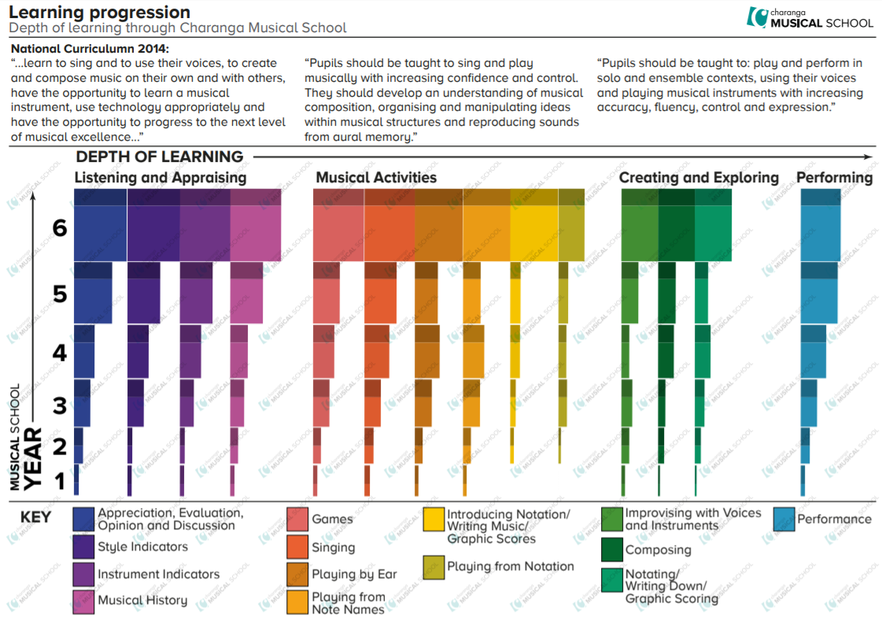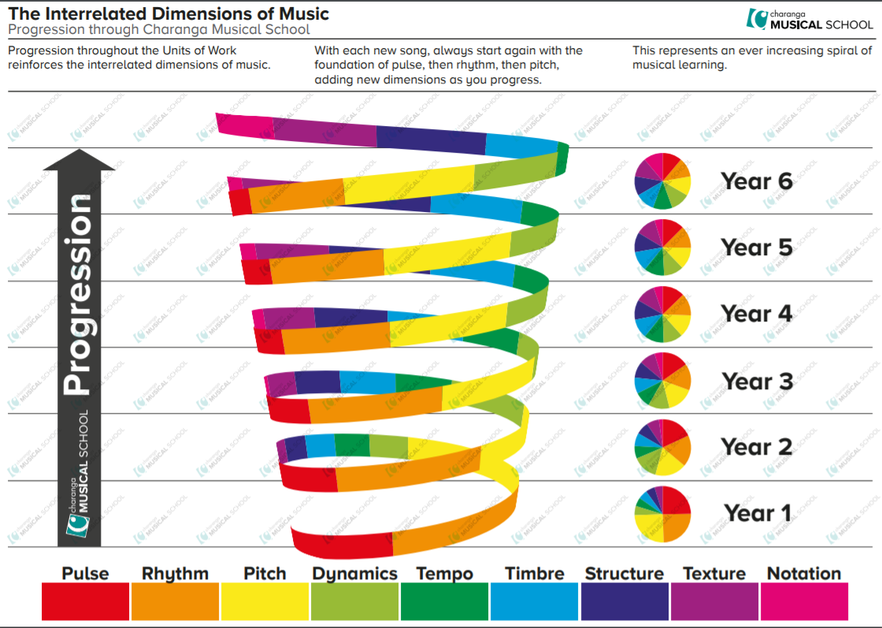
Music
Intent
At Ashmead School, our musicians are encouraged to become ‘more musical’ through a progressive model and ambitious curriculum. Curriculum aims are achieved through developing pupils understanding of how to perform, compose, listen and evaluate music, underpinned by the pillars of progression. Our pupils are exposed to a range of musical traditions, styles and genres to demonstrate a diverse and rich music history. We are committed to ensuring pupils understand how music reflects our culture and society, and inspire them to develop a love of music and embrace their talent as musicians. They will develop their creativity, self-confidence and sense of achievement by applying their knowledge through the inter-related dimensions of music, when performing, improvising, composing and analysing. Music provides the opportunity for personal expression, as it can play an integral part in the personal development of an individual. Music is a universal language, a unique way of communicating and a fantastic way to build community.
Implementation
Our Music curriculum continues to develop and evolve. We use Charanga, and the English Model Music Curriculum scheme to support the teaching and learning within music.
Charanga’s teaching and learning platform of carefully crafted unit schemes from Early Years through to Year 6, are designed to fulfil the Music National Curriculum 2014 requirements giving our pupils high quality, fun and inspiring musical experience. The Model Music Curriculum provides a practical structure for delivery and springboard from which to approach teaching.
In Early Years, singing is used daily to support pupils learning across the curriculum. Pupils have access to percussion instruments in continuous provision, where they explore and experiment with the inter-related dimensions of music though copying games, chants and developing fine motor skills in preparation for future learning.
From Year 1 to 6 pupils acquire their knowledge of music through Charanga schemes of work. Charanga’s scheme is the basis for our curriculum planning which builds upon prior learning. While there are opportunities for pupils of all abilities to develop their skills and knowledge in each teaching unit, the progression is planned into the Charanga’s scheme of work meaning pupils are increasingly challenged.
Pupils will acquire knowledge of music’s three pillars of progression, technical, constructive and expressive, which contribute collectively to the musical understanding of all pupils.
Our Curriculum Coverage
|
|
Autumn |
Autumn |
Spring |
Spring |
Summer |
Summer |
|
Reception |
Me |
My Stories |
Everyone! |
Our World |
Big Bear Funk |
Reflect, Rewind, Replay |
|
Year 1 |
My Musical Heartbeat |
Dance, Sing and Play |
Exploring Sounds |
Learning to Listen |
Having Fun with Improvisation |
Let’s Perform Together |
|
Year 2 |
Pulse, Rhythm and Pitch |
Playing in an Orchestra |
Inventing a Musical Story |
Recognising Different Sounds |
Exploring Improvisation |
Our Big Concert |
|
Year 3 |
Writing Music Down |
Playing in a Band |
Compose Using Your Imagination |
More Musical Styles |
Enjoying Improvisation |
Opening Night |
|
Year 4 |
Musical Structures |
Exploring Feelings When You Play |
Compose with Your Friends |
Feelings Through Music |
Expressions and Improvisation |
The Show Must Go On |
|
Year 5
|
Melody and Harmony in Music |
Sing and Play in Different Styles |
Composing and Chords |
Enjoying Musical; Styles |
Freedom to Improvise |
Battle of the Bands |
|
Year 6 |
Music and Technology |
Developing Ensemble Skills |
Creative Composition |
Musical Styles Connect Us |
Improvising with Confidence |
Farewell Tour |
In year 4, each class learns an instrument alongside the specialist teaching service for a 12-week block.

Curriculum mapping identifies how pupils will progress through music-based activities to: perform, compose and listen to music across a range of historical periods, genres, styles and traditions, considering significant composers and musicians. This also includes understanding and exploring how music is created, produced and communicated through the inter-related dimensions: pitch, duration, dynamics, tempo, timbre, texture, structure and appropriate musical notations.

Technical development involves opportunities to perform through singing, playing instruments and using music technology so pupils can perform with increasing complexity from Early Years to Year 6. Pupils also construct knowledge which develops their understanding of how musical components can be constructed and deconstructed, supporting their development as composers and listeners. They think creatively and analytically deepening and broadening knowledge about how music works. Inter-related dimensions are explored and compared across a wide range of music, while compositions may be specific to genre. Expressive knowledge focuses on quality, meaning and creativity.
Pupils will all learn a minimum of two instruments by the time they leave us, including glockenspiels and African drums. There is also a large selection of percussion instruments available at Ashmead. The school is committed to expanding present equipment when necessary and possible. The aim is to motivate both staff and pupils to take part in musical activities together. Pupils are taught how to use musical equipment safely and appropriately.
Gathering evidence of pupil progress is an integral part of assessment, which is built into the Charanga schemes of work. Key vocabulary is taught to enable pupils to speak like musicians and showcase their knowledge of the subject.
Pupils take part in musical rehearsal and performances throughout the year to a host of different audiences, contexts and settings. They have the opportunity to perform to each other, other classes, teams, parents and the wider community. We consider how music and oracy can support pupil performance.
Pupils can also sign up to iRock School of Music receiving Rock Band tuition in either singing, keyboard, electric or bass guitar and drums. A school choir is run after school throughout the year focusing on different styles of music with performances both in and out of school. Cross curricula opportunities are identified where music can support pupils learning within other subject areas, e.g. Jigsaw, Mindful Minute, dance
Impact
Music is a subject which complements and supports other areas of the curriculum. It is known to improve pupil’s memory, concentration, co-ordination and self-confidence. Pupils will have access to a varied curriculum of music, which will allow them to learn and expand areas of strength and areas they hope to improve. Pupils will acquire a palette of knowledge from their experiences at school from many cultures and musical styles, broadening their understanding of music across our forever changing world. Our pupils will speak enthusiastically about their musical experiences at Ashmead reflecting on their achievements and desires. They will feel passionately about music and enjoy music in whatever way they choose, whether as a creator, performer or listener. Equipped with this knowledge, we give our pupils the musical tools so they are prepared for the next stage of their education and ready for life in the wider world.







